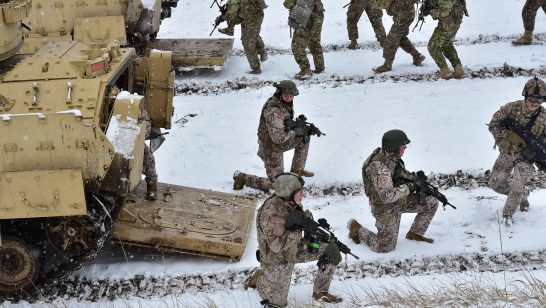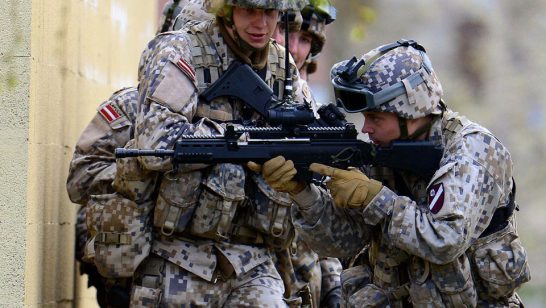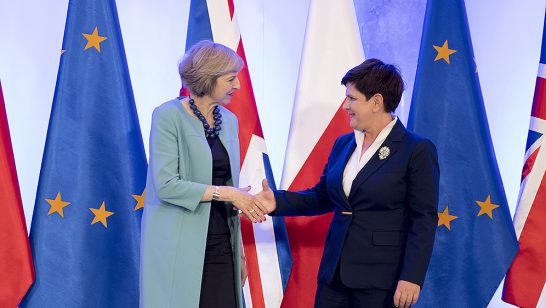
The gathering of 27 EU leaders on 25 March to mark the Rome Treaty’s 60th anniversary was hardly a visionary affair, least of all on defence and security. Brexit and the French elections put rather a dampener on vision.
Yet Europe could use some vision right now. The forces undermining the continent’s security have not been so great, or so grave, for decades. And the EU is sitting on a visionary idea, not knowing quite what to do with it.
Last July’s EU Global Strategy on Foreign and Security Policy “nurtures the ambition of strategic autonomy for the European Union”. And last October EU member states “fully committed” to the Global Strategy’s implementation.
Unfortunately, the end goal of “strategic autonomy” is nowhere defined. So the effect is corrosive for intra-EU, EU-NATO and transatlantic trust rather than visionary about Europe taking responsibility for its own defence and security.
But the idea of being able to look after one’s own security is not strange. Why should the planet’s biggest economy, with most of its richest societies, enjoying some of its strongest institutions, with almost 20% of the world’s military spending and two nuclear powers, not be able to act autonomously on its own defence?
There are four reasons why not, but these should not be the end of the story:
First, since 1945 Europeans have depended on the US: two world wars radically diminished their interest in hard military effort. So, at a strategic level, Europe doesn’t appear to have the military capability to defend itself by itself. It lacks enough of essential things like communications, precision guided munitions, sea and air lift, air-to-air refuelling, and intelligence, surveillance and reconnaissance that only the Americans can provide in sufficient quantity.
Second, although the EU is strong on many aspects of security, it depends on a different institution for large-scale hard defence: NATO. So in a strategic sense, institutionally the EU cannot be fully autonomous.
Third, if the EU and its member states ever agreed to do high-end security all on their own, this would take a long time to build up. NATO planners assess that, best case, by the early 2030s European Allies will still depend on the US for over one third of the military capabilities required to defend Europe. Europeans will depend on Americans for quite a few decades yet.
Fourth, with the departure of the UK goes 25% of the military capability in principle available to the EU. If they were serious about “strategic autonomy”, Paris and Berlin would want defence arrangements that engaged the UK’s considerable military capabilities. So that would not be inside the EU, even if the EU continued to provide most of the continent’s softer security.
But suppose the EU’s 27 remaining leaders reframed the “strategic autonomy” vision for their meeting with President Trump on [25] May?
Suppose instead of saying that the “EU” should be strategically autonomous they were slightly more modest and said that by, say, 2049, one hundred years after NATO’s Washington Treaty was signed, “Europe” should be strategically autonomous and that the EU would play its full part? They might add that they looked forward to working with NATO on a roadmap to get there.
That would put them in the lead on a vision that should please everybody.
For those like the British Government who think the EU arrogates too much to itself and is unrealistic about European construction, this would recognise that Europe’s security and defence depends on EU-NATO collaboration. Recognising the time, effort and realism required for European autonomy would be politically healthy, not least in the Brexit debate.
For those who fear that talking about US disengagement will hasten the day, this says nothing about putting NATO out of business or of wanting to work less with the US. The best way to keep the US engaged is for Europeans to show that they can be stronger Allies by taking more security responsibility.
For Americans frustrated at Europeans’ lack of commitment to their own defence, this would be a European political undertaking which outlasts the ten year 2% of GDP defence spending pledge, and a welcome dose of realism about the time and effort required. Money alone won’t buy US love. What successive US administrations have sought is a strong Europe not a militarily dependent one.
For those Europeans frustrated at a perceived lack of autonomy, a roadmap to real, rounded European defence and security capabilities is better than more EU rhetoric.
What is needed is a serious commitment on both sides of the Atlantic to “unlock” the European assets now locked into NATO’s integrated military structure, and to create a genuine European defence and operational pillar as the basis for strategic autonomy. This would mean a major European investment in the sort of enabling capabilities on which Europe is so comfortably dependent on the US. Rather than Europeans just responding to pressure from President Trump on 2%, autonomy might be a goal that actually mobilises further burden-sharing.
Though NATO is far from “obsolete”, it was clear before Donald Trump took office that the transatlantic link cannot continue as is indefinitely. For the health of the transatlantic relationship, as well as the future of NATO, change is necessary, or the risk of obsolescence will become real.
Spelling out now that by 2049, a century after the US came enduringly to Europe’s rescue, Europe intends to stand on its own two feet, would do a power of good for the transatlantic, EU-NATO and intra-European defence debates. The EU and Europeans in NATO should stop travelling unconvincingly and instead set a destination, with a roadmap and timetable. Europe needs vision right now. And collective security is a good place to start.
The opinions articulated above represent the views of the author(s), and do not necessarily reflect the position of the European Leadership Network or any of its members. The ELN’s aim is to encourage debates that will help develop Europe’s capacity to address the pressing foreign, defence, and security challenges of our time.



